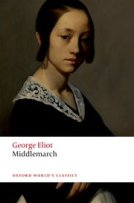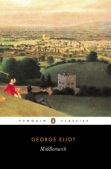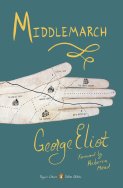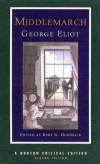General Considerations
The first thing to consider is whether you want everyone in your group to use the same edition of Middlemarch. My own book club experience (as well as my classroom experience) has taught me that it can be frustrating trying to talk about a long book when people quite literally can’t get on the same page. Even if you think that this would be a good thing, it may prove impractical, as people may already own copies, or may prefer one version over another for their own reasons. However, because Middlemarch is divided into Books and then into chapters, it’s not that hard to find common reference points. It can also help a lot if people use some system of navigational aids, like post-it notes.
The next question is whether you want to use a ‘popular’ or a scholarly edition. With a novel like Middlemarch, I think it’s a good idea to have a reliable, well-edited text with thorough annotations–not because you must consult them, but because you may want to. Scholarly editions not only include thoughtful introductions and explanatory footnotes (helpful for everything from literary allusions to historical contexts) but also point out changes made to the novel over its publishing history. One of the most interesting of these in Middlemarch is a tweak to the Finale that might spark some debate among the members of your book club, especially if you’ve talked along the way about how far Dorothea is responsible for her own bad choices.
SOME RECOMMENDED EDITIONS OF MIDDLEMARCH

Oxford World’s Classics: This is the edition I usually assign in my classes. It’s readily available, Felicia Bonaparte’s introduction is illuminating, the notes are good but not overwhelming, and the layout is readable and leaves enough room for annotations. There is a new edition as of 2019, with the out-of-order paragraphs that were in the previous one corrected but still with Rosamond’s name mis-spelled on the back. I do wish they hadn’t chosen such a dreary image for the cover! Dorothea is young and enthusiastic – at least when the novel opens.
 Penguin Classics: This is another fine, reliable edition, with a good introduction by Rosemary Ashton; it has the benefit of also being available as an e-book, which may be an advantage if some of your members use e-readers.
Penguin Classics: This is another fine, reliable edition, with a good introduction by Rosemary Ashton; it has the benefit of also being available as an e-book, which may be an advantage if some of your members use e-readers.
 Penguin Deluxe Classics: This new edition has the same text as the Penguin Classics edition but includes none of the notes, which may be a drawback for some purposes. The heavy paper and elegant font make it one of the nicest editions just to read and enjoy. It includes a user-friendly introduction by Rebecca Mead, author of My Life in Middlemarch.
Penguin Deluxe Classics: This new edition has the same text as the Penguin Classics edition but includes none of the notes, which may be a drawback for some purposes. The heavy paper and elegant font make it one of the nicest editions just to read and enjoy. It includes a user-friendly introduction by Rebecca Mead, author of My Life in Middlemarch.
 Norton Critical Edition: This edition is the most scholarly of the options, in that it conveniently packages a scrupulous edition of the novel with a selection of critical essays about it. If that’s the kind of thing your book club likes, this is the edition for you. If you doubt you’ll want to read the criticism, however, I recommend an edition with larger type!
Norton Critical Edition: This edition is the most scholarly of the options, in that it conveniently packages a scrupulous edition of the novel with a selection of critical essays about it. If that’s the kind of thing your book club likes, this is the edition for you. If you doubt you’ll want to read the criticism, however, I recommend an edition with larger type!
 Broadview Press Edition: This handsome edition of Middlemarch is supplemented by contemporary reviews and documents (rather than the mostly 20th-century critical materials included in the Norton). It is annotated in great detail, with special attention paid to the role of the visual arts in the novel; it is the only one of these editions that includes pictures. The footnotes do occasionally almost overwhelm the novel itself. This edition is also available as an e-book.
Broadview Press Edition: This handsome edition of Middlemarch is supplemented by contemporary reviews and documents (rather than the mostly 20th-century critical materials included in the Norton). It is annotated in great detail, with special attention paid to the role of the visual arts in the novel; it is the only one of these editions that includes pictures. The footnotes do occasionally almost overwhelm the novel itself. This edition is also available as an e-book.
I’ve put links to some free electronic full-text editions of Middlemarch on the ‘Links‘ page. I don’t particularly recommend these for reading the whole novel, though of course you may find them fine for your purposes. The searchable e-texts are great, however, for finding lines you remember but forgot to mark with post-its!
I haven’t read this since undergrad days many years ago, but feel inspired to revisit it – am in the process of choosing what to take on an extended holiday in the US, but it’s perhaps a bit bulky to travel with, & I don’t fancy using my Kindle for such a long text. I don’t belong to a book club, but will follow this blog with interest. Thanks for taking the trouble to put it together.
Now in my 70s, I’m a first-time reader of “Middlemarch.” I started with the Penguin Classics paperback edition and very much appreciated its footnotes, which explain references to historical events and arcane customs and terms in the text. But my eyes grew tired after a few pages of sorting out some of Eliot’s knottier, convoluted sentences, so I purchased the same edition in Kindle Fire format. Immediately I found the book more readable. Thanks to the larger typeface and back lighting. I was able to get through five or six chapters at a sitting, with easier comprehension and greater enjoyment.
Do you happen to know if the 2019 edition of the Oxford World Classics edition corrects the issue with the out of order paragraphs?
Thank you so much for putting together this amazing resource!
They are corrected! They were near the end of Book III Ch. xvi and I just compared the two versions to be sure.
Are there any hardcover editions of Middlemarch that you are fond of?
The copy I’ve been reading for years (since I was a teenager) is the Modern Library companion edition to the BBC miniseries, with a painting of the main characters as played on the series on the front cover. I’ve been reading this edition for years and is pretty much my default copy of the novel. But there are other editions I read and enjoy too. I love the Everyman’s Library one a bit, and I read it in Penguin Clothbound Classics, which wasn’t bad. I’ve been contemplating getting the Folio Society edition because it looks lovely with beautiful illustrations but I wonder if its a good investment or not?
I have actually never owned a hardcover edition of Middlemarch! As it is such a long book, I imagine they would be quite heavy for holding to read. I have eyed the listing for the Folio Society edition, as these are always beautiful, but at least for me personally, I think it would not be worth it as it would probably just sit on the shelf. The Penguin Deluxe is by far the nicest paperpack I’ve come across, just for elegance and ease of reading.
Hey thanks for replying!
As for what you said:
1.) Actually, the hardcover copies I own are not heavy at all. Quite the opposite. My Modern Library hardcover feels pretty light despite being 800+ pages. Though of course, you can feel its weight due to the fine page quality, something you wouldn’t feel if it was the grainy wood pulp paper. But it is not heavy. The same can be said for the Everyman and Penguin Clothbound editions. Obviously, editions from the Folio Society or Easton Press would be heavier due to using bigger hardcover boards and bigger sheets of paper.
2.) Re: Folio. I definitely see where you’re coming from and I agree to the extent that books for display purposes are a wast of time. That’s why I don’t care for stuff like Easton Press. Other than display, it is not reader-friendly and books imo are meant to be read first and foremost. Though nothing wrong with reading with care, which I always do (hence why my ML copy of Middlemarch still looks almost new despite being 26+ years old. Also, Easton Press uses shitty texts for the novels they publish. No accurate texts and no critical apparatus. That being said, Folio Society editions have the virtue of being both lovely to look at and very reader-friendly. I own some Folio volumes and they read quite beautifully without any damage, provided you treat them well. I know many who have bought Folio’s and enjoy reading them. So I feel like the Folio edition of Middlemarch would fit both a reader-friendly and an art-friendly purpose. Plus the illustrations looked lovely. Idk we’ll see if I get it or not.
3.) I think you would love the Penguin Clothbound edition if you think of getting a hardcover. It’s a well made hardcover complete with a ribbon marker yet it uses the same critical text published in the paperback series, complete with footnotes and introductions. That’s why I like that edition.
Which copy of middlemarch would you personally recommend. I am confused between the Oxford world classics and the penguin deluxe edition. This is the first time I will be reading middlemarch and I want a copy which brings the novel alive in every sense of it…
It really depends on what you want. The Penguin Deluxe is a lovely edition (nice font, nice paper, all very aesthetically pleasing) but has no editorial apparatus: that might be the best way to let the novel reach you directly. But if you like to know about contexts or contemporary or critical discussions, the Oxford would be my recommendation. It’s the one I use for teaching.
Just a note to thank you for this. I’m finally reading Middlemarch for the first time, after decades of having it recommended to me by people whose judgment I trust. I think I was prejudiced against Eliot by having read Silas Marner in high school (or was it just an excerpt?–I don’t remember now), and not much liking it. Someone prodded me recently, and I decided the time had come, and got it from the library.
After a few chapters I began to feel like stout Cortez and knew I needed to buy my own copy, but have been bewildered by the choices, since I can’t actually look at them. The one I’m reading is the Modern Library, but I’d like one with notes. I’m partial to the Norton Critical series, but several Amazon reviews remarked on the small print, and although I’m eager to read good criticism of the book (once I finish it), recent criticism in general is likely to be politically tendentious, so why pay the price of small print for stuff I don’t really want to read? It looks like the Oxford may be the one for me.
Thank you again, and I’m sure I’ll be back to read more of what you have here when I’ve finished the book–I just reached the end of Book III.
I will second Marlin’s comments. I am also looking to read a George Eliot novel for the first
time for my own pleasure, so I will start with Middlemarch. I think an annotated edition with comments on the same page as the relevant point might help me get the most out of the book. I get the impression from your description that the Broadview Press edition might be best for my purposes.